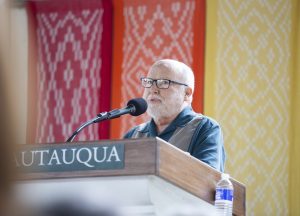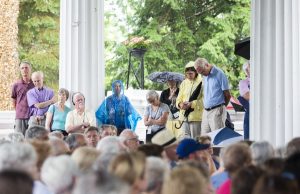
MHARI SHAW/STAFF PHOTOGRAPHER
Fr. Richard Rohr, OFM, said that, in the least, one can find the answer to what “The Transition” is through the epigraphs in his book, Falling Upward: A Spirituality for the Two Halves of Life.
“What is the normal goal to a young person becomes a neurotic hindrance in old age,” Rohr quoted from his book.
Rohr said many older people find themselves stuck in the culture of the first half of life, where they continue to live by the values of fame and wealth. However, there comes a point when one must look inward to contemplate life and “discover your soul.”
Rohr, Franciscan priest of the New Mexico Province and founder of the Center for Action and Contemplation in Albuquerque, New Mexico, continued his lecture series Tuesday in the Hall of Philosophy as part of Week Four’s interfaith theme, “Falling Upward: A Week with Richard Rohr.” His lecture was titled “The Transition.”
Rohr said that when one thinks of falling upward in religious terms, one normally associates such a journey with Jesus and the Resurrection, and this is what is celebrated on Easter: the Resurrection of Christ in which he is worshiped, not imitated, Rohr said.
“Human beings have a strange quality,” Rohr said. “If a spiritual message does not somehow include you and me, you’re not interested in it. And that’s unfortunate. We’ve told the story of Jesus in such a really unspiritual way, … and that’s why it doesn’t work for transformation, because it’s always looking outside yourself and you’re supposed to worship someone else who did it right.”
Rohr said this worshiping doesn’t work for transformation. Rather, Rohr prefers to use the Greek epic poem, The Odyssey, because it is a text that cannot be taken as literally as Biblical scriptures.
“Symbolism is 10 levels of meaning, and it fascinates the soul and the mind and the heart,” Rohr said. “As you look for that, that deeper meaning, sure, you can make mistakes, but haven’t we made enough mistakes with our literalism? I think so. So we’ve still got a lot of growing up to do.”
The Odyssey is the tale of Odysseus, who after fighting and winning the Trojan War, returns home to his family, only to be called to a second journey — or what Rohr quotes David Brooks as terming, “the second mountain.”
Odysseus’ first journey is like one’s first half of life, which Rohr also called the “survival dance.” The second half of life is the second journey, which he termed the “sacred dance.” As he said Monday, many people struggle to move from the survival dance to the sacred dance because the survival dance involves making money, and no one wants to stop making money once they’ve started. So, they never move on.

“You do more and more of the same thing even though it isn’t working anymore and you don’t need it anymore,” Rohr said. “I hope this is giving loads of permission all over the place to take second journeys.”
Rohr then shard a scene from The Odyssey, in which the ghost of Tiresias, with a golden scepter in his hand, told Odysseus of his next trip; how he must go to the mainland with a well-made oar to a people who have never heard of the sea, ships or salting their food. The ghost of Tiresias also said the oar Odysseus made would be a winnowing shovel.
“The very same metaphor Jesus uses — which is used to discriminate between the essentials and the nonessentials, between the wheat and the chaff, between what matters and what doesn’t matter,” Rohr said. “That’s how you move into the second half of life. What are the essentials and what are the nonessentials?”
This prophecy that Odysseus is receiving from Tiresias is important in terms of location, too, Rohr said. Odysseus receives this prophecy while he is in Hades, the place of the dead. Just like most of the human race has to hit rock bottom before going up — what Rohr refers to as “falling upward” — Odysseus is at the bottom when he learns of this prophecy.
So, when Odysseus returned home and then was told to leave again as the prophecy had foretold, Rohr said he had to be pushed, as no one can go on a second journey without being pushed.
“Loss of a job, loss of reputation, loss of a marriage, loss of faith — it’s always got to be a loss of something that you thought was you, that you thought was essentially you, and you could not live without it, and you have to find out that that’s not true,” Rohr said.
This is what makes the entire journey religious, Rohr said. He said the Latin term religiō means to reconnect. Therefore, the process of reconnecting is religious.
“The more you can include, the more you can connect, I would say the more religious you are. … It is, in a word, universal; God allows you universal compassion,” Rohr said. “Odysseus is also reconnecting his outer journey to the mainland, or his interior world. At least that’s the way I would see it, which is much of the task of the second half of life.”
In the same way an extrovert becomes an introvert with age and an introvert becomes more of an introvert with age, one writes the script of their life in the first half of life, Rohr said. Then, the second half of life is about writing the commentary on that life.
“The first world, the first half of life — of occupation and productivity — must now find its full purpose,” Rohr said. “The second half of life is not about productivity alone. The amazing thing is you still are (productive), but it’s about generativity, inner generativity.”
Rohr believes the whole Gospel to be about forgiveness, which he said is a religious term for letting go of what is being dragged around. The ego or persona that one develops in the first half of life is something that needs to be let go of, he said.
Before returning home, Odysseus’ last task is to plant his oar in the ground of the mainland and then leave. Rohr compared this to how Jesus told his disciples to leave their families and occupations behind. Just as they did, Odysseus planted his oar, and this is the end of Odysseus’ second journey.
“Odysseus has to return home to Ithaca to prepare a solemn sacrifice to all the gods who rule the broad heavens in human language,” Rohr said. “He’s finally living inside the big and true picture in Christian language. He is finally connected to what Jesus called the reign of God.”
Rohr closed his lecture with a personal commentary on life.




